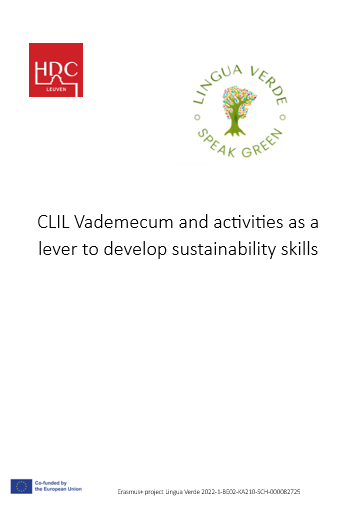CLIL

Our Erasmus+ project was dedicated to interlace the core subject of "sustainability" with foreign language teaching. Our main purpose involved employing the Content and Language Integrated Learning (CLIL) methodology in order to familiarize our students with the importance of adopting a sustainable lifestyle.
We wanted to create teaching material in the foreign language teaching to foster creative language teaching.
So, in March and May we collaborated with Liesbeth Martens, an expert in the field of CLIL at UCLL's CLIL department.
Between February and May 2023 the students involved in this project received soft CLIL lessons in English (on sustainability, the ecological footprint, the importance of water, climate change) and in French using already existing material.
For English:
3/2: introductory lesson on sustainability
29/5: introduction ecological footprint & how to calculate it
30/5: finding material in English for CLIL lesson on water.
For French:
3/3: introducing EU (what, who, how) and Erasmus+ 10/3 & 17/3: quiz écologique, un peu de vocabulaire sur l'écologie & l'environnement, but du projet, qui sont nos partenaires et où se trouvent-ils ?
31/3: presentation Climate Week programme.
CLIL material in English
In September 2023 we wrote a "Vademecum for CLIL Teachers.". However, we didn't restrict ourselves to merely producing the Vademecum; instead we converted theory into practice by creating our own teaching materials tailored for two separate CLIL activities. The initial activity revolved around the broader concept of sustainability whereas, the latter focused primarily on addressing water sustainability issues. The decision to focus on the topic 'water' was inspired by an international workshop in which our students, together with the Italian students of the “Liceo Vittorio Emanuele II di Jesi (AN), participated at the Mniemeninstituut-Leuven. Under the guidance of Dirk Staf (Erasmus+acquisition adviser and project manager at UCLL and English & German teacher at the Miniemeninstituut) and with the assistance of the science teacher Lieve Moeyersons (science teacher at the Miniemeninstituut and science teacher at KULeuven), our students engaged in hands-on experiments that highlighted the importance of water filtration. This experience served as a catalyst for our project, prompting us to explore the topic of water sustainability. Back at school, our students searched for authentic sources and gathered valuable information on water sustainability. Their discoveries were used in the preparation of our CLIL activities in English.
Our thanks go out to Liesbeth Martens, Dirk Staf, Lieve Moeyersons plus all participants who played roles in this venture.
CLIL material in Frech
In the 2023/2024 academic year, CLIL materials were also developed for French.
The novel *Bloody Phone Mission Blackbone Tome I* by Maylis Jean-Préau and others was selected for the "5 Modern Languages: 5MT" class, which began reading it in January 2024. The book, addressing "blood minerals" in Africa, fits perfectly into the project and is appropriate for teenagers aged 15 and up.
It could potentially be used in future classes for both 4MT or 5MT. The novel can complement environmental lessons in Pelckmans textbooks. A pedagogical dossier, outlining the structure of the lessons and reading, has been designed and is available for teachers.
In November 2023, the 5MT class visited an exhibition at the City Hall of Leuven, which posed the question, 'Is My Smartphone Really Smart for the Planet?' To prepare, the students completed a folder written in Dutch (reviewed in French during a lesson) and one student made an extensive vocabulary list. Three students also translated this folder into French for future classes, testing translation applications and learning the importance of context in translation. The original version was created by Gent Fair Trade, which gave permission for the translation provided the photos were not reproduced.
Each student was also required to choose a specific creative activity at the end of their reading: creating a poster or a collage from different facets of the novel, writing a poem, making a video, designing a new book cover, composing a song, creating a comic strip, or drawing. These activities were meant to provide a personal commentary on the story.


